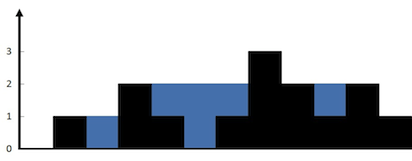42. Trapping Rain Water
Array Two Pointers Dynamic Programming Stack Monotonic Stack
Problem - Trapping Rain Water
Hard
Given n non-negative integers representing an elevation map where the width of each bar is 1, compute how much water it can trap after raining.
Example 1:
Input: height = [0,1,0,2,1,0,1,3,2,1,2,1] Output: 6 Explanation: The above elevation map (black section) is represented by array [0,1,0,2,1,0,1,3,2,1,2,1]. In this case, 6 units of rain water (blue section) are being trapped.
Example 2:
Input: height = [4,2,0,3,2,5] Output: 9
Constraints:
n == height.length1 <= n <= 2 * 1040 <= height[i] <= 105
Solutions
1 2 3 4 5 6 7 8 9 10 11 12 13 14 15 16 17 18 | |
Submission Stats:
- Runtime: 11 ms (71.17%)
- Memory: 19.7 MB (7.78%)
